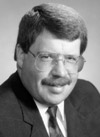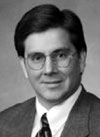Award recipients announced; Bar honors members at Annual
Convention
2004 President Award Recipients
May 4, 2004
President George Burnett will recognize individuals who have served
with distinction during his term of office at the Members' Recognition
Luncheon in Madison on May 7. The awards will be presented at the State
Bar Annual Convention at the Monona Terrace Convention Center.
John Bermingham
 John Bermingham chaired a committee of State Bar members
that revised and updated the State Bar's rules and bylaws. This
ambitious project began in the presidential term of Gerald Mowris,
proceeded through Pat Ballman's years, and its final work product
is expected to be debated and voted upon by the Board of Governors this
year. If passed by the Board of Governors, and approved by the supreme
court, these revised rules and bylaws will be the first significant
revision undertaken by the Bar in several decades. The award is jointly
conferred by Bar presidents, Gerald Mowris, Pat Ballman, and George
Burnett.
John Bermingham chaired a committee of State Bar members
that revised and updated the State Bar's rules and bylaws. This
ambitious project began in the presidential term of Gerald Mowris,
proceeded through Pat Ballman's years, and its final work product
is expected to be debated and voted upon by the Board of Governors this
year. If passed by the Board of Governors, and approved by the supreme
court, these revised rules and bylaws will be the first significant
revision undertaken by the Bar in several decades. The award is jointly
conferred by Bar presidents, Gerald Mowris, Pat Ballman, and George
Burnett.
Gwendolyn Connolly
 Gwen Connolly chaired a committee dealing with the
important and timely subject of flexible work options for Wisconsin. The
committee developed an extensive report, available on the State Bar Web
site, aimed at issues that address leaves of absence, alternative work
schedules, and telecommuting.
Gwen Connolly chaired a committee dealing with the
important and timely subject of flexible work options for Wisconsin. The
committee developed an extensive report, available on the State Bar Web
site, aimed at issues that address leaves of absence, alternative work
schedules, and telecommuting.
In conjunction with the Gender Equity Committee, the committee also
developed a program addressed at balancing work and personal life for
presentation at this convention. The committee's work is
recognition that choosing between personal and professional life should
not be a dilemma that lawyers face and that economic and practical
solutions are available to those facing these issues.
Dean Dietrich
 Dean Dietrich chaired the special committee responsible
for the study and development of changes to the Supreme Court Rules and
State Bar Bylaws pertaining to multijurisdictional practice. In this era
of electronic communication, lawyers frequently cross state borders in
representing clients. The work product of the MJP committee proposes
changes to modernize our ethics rules and State Bar bylaws so as to
conform to changing practice in the 21st century.
Dean Dietrich chaired the special committee responsible
for the study and development of changes to the Supreme Court Rules and
State Bar Bylaws pertaining to multijurisdictional practice. In this era
of electronic communication, lawyers frequently cross state borders in
representing clients. The work product of the MJP committee proposes
changes to modernize our ethics rules and State Bar bylaws so as to
conform to changing practice in the 21st century.
William Domina
 William Domina, currently Corporation Counsel for Milwaukee
County, chaired a study committee dealing with the politicization of the
judiciary. The committee's work spanned two years, culminating in
a recommendation to the American Bar Association, which undertook a
comparable study. The committee's work was quoted extensively in
the ABA final report. After the ABA report was issued, the committee
analyzed the ABA report and specifically addressed issues of campaign
financing, rhetoric in political campaigns, judicial diversity, judicial
evaluation, and budget and funding issues for our courts. The report was
furnished to the Board of Governors for its consideration and for future
reference.
William Domina, currently Corporation Counsel for Milwaukee
County, chaired a study committee dealing with the politicization of the
judiciary. The committee's work spanned two years, culminating in
a recommendation to the American Bar Association, which undertook a
comparable study. The committee's work was quoted extensively in
the ABA final report. After the ABA report was issued, the committee
analyzed the ABA report and specifically addressed issues of campaign
financing, rhetoric in political campaigns, judicial diversity, judicial
evaluation, and budget and funding issues for our courts. The report was
furnished to the Board of Governors for its consideration and for future
reference.
Nathan Fishbach
 Nathan Fishbach led a committee that developed and
produced, with considerable assistance from State Bar staff, and cochair
Tom Dixon, director of the State Bar CLE Department, a program aimed at
bridging the gap between graduation from law school and practice of law.
The practice of law is an art, not a science, and while our law schools
train their graduates very well in the science of the law, life for a
recent law school graduate can be difficult and stressful while he or
she learns the art of practicing law. In a program that was presented
live in three cities, and was extraordinarily well-attended and
received, Nathan Fishbach and this committee developed a prototype for
bar associations across the country. The program was dedicated to the
memory of past Bar president, Leonard Loeb, who was instrumental in its
formation.
Nathan Fishbach led a committee that developed and
produced, with considerable assistance from State Bar staff, and cochair
Tom Dixon, director of the State Bar CLE Department, a program aimed at
bridging the gap between graduation from law school and practice of law.
The practice of law is an art, not a science, and while our law schools
train their graduates very well in the science of the law, life for a
recent law school graduate can be difficult and stressful while he or
she learns the art of practicing law. In a program that was presented
live in three cities, and was extraordinarily well-attended and
received, Nathan Fishbach and this committee developed a prototype for
bar associations across the country. The program was dedicated to the
memory of past Bar president, Leonard Loeb, who was instrumental in its
formation.
Gerardo Gonzalez
 Jerry Gonzalez is the program chair for the Diversity
Counsel Program, a function of the Diversity Outreach Committee that
began in 1995. The program's objective is to increase
opportunities for minority and women lawyers within the legal
profession. The annual June diversity luncheon provides a platform for
addressing issues and concerns pertaining to barriers associated with
minority and women lawyers being hired in practice areas in which they
are traditionally not represented, or are rarely utilized.
Jerry Gonzalez is the program chair for the Diversity
Counsel Program, a function of the Diversity Outreach Committee that
began in 1995. The program's objective is to increase
opportunities for minority and women lawyers within the legal
profession. The annual June diversity luncheon provides a platform for
addressing issues and concerns pertaining to barriers associated with
minority and women lawyers being hired in practice areas in which they
are traditionally not represented, or are rarely utilized.
William (Byll) Hess
 Byll Hess chaired the Law Practice Management Assistance
Program Study Committee, a committee specially charged with developing a
new State Bar of Wisconsin program. The program is designed to assist
all Wisconsin practitioners, sole and small firm, large firm, and
government and private sector attorneys alike, in issues they encounter
in managing a busy law practice, from the formation of a practice to its
close, to all practice management issues concerned in between. If
funding is approved by the Board of Governors at its upcoming meeting,
the program will soon be available to assist State Bar members in this
important endeavor.
Byll Hess chaired the Law Practice Management Assistance
Program Study Committee, a committee specially charged with developing a
new State Bar of Wisconsin program. The program is designed to assist
all Wisconsin practitioners, sole and small firm, large firm, and
government and private sector attorneys alike, in issues they encounter
in managing a busy law practice, from the formation of a practice to its
close, to all practice management issues concerned in between. If
funding is approved by the Board of Governors at its upcoming meeting,
the program will soon be available to assist State Bar members in this
important endeavor.
Gerry Mowris
 |
|
Mowris
|
 |
|
Tobin
|
Mike Tobin
Gerry Mowris and Mike Tobin cochaired a special State Bar committee
appointed by State Bar President R. George Burnett and named "Lawyers
for Learning." Lawyers for Learning was developed to encourage attorneys
to volunteer in local schools as a way to help Wisconsin children learn
about the law, to promote cooperation between state and local bar
associations, and to enhance the image of the legal profession. In
addition to multiple school presentations, the committee also used this
program as a way to educate elementary school children about the
Brown v. Board of Education decision. The committee also
produced activities for other attorneys to use when they go into the
classroom.
Jo Ann Prust
 Jo Ann Prust recently chaired a committee that studied and
formed, with the approval of the Board of Governors, an agricultural
law/agribusiness section. The section's mission is to serve those
lawyers in Wisconsin who specifically address the needs of farmers and
the businesses who transact business with farmers. This substantive area
of the law crosses boundaries in business, bankruptcy, environment,
litigation, labor, real property, and taxation. Lawyers serving this
segment of society have specialized needs, and this section will serve
those needs.
Jo Ann Prust recently chaired a committee that studied and
formed, with the approval of the Board of Governors, an agricultural
law/agribusiness section. The section's mission is to serve those
lawyers in Wisconsin who specifically address the needs of farmers and
the businesses who transact business with farmers. This substantive area
of the law crosses boundaries in business, bankruptcy, environment,
litigation, labor, real property, and taxation. Lawyers serving this
segment of society have specialized needs, and this section will serve
those needs.
John Skilton
 John Skilton chaired the Keller Review Committee, a
committee composed of State Bar members knowledgeable about the
litigation over the mandatory nature of our Bar Association. The
committee's purpose was to educate the Board of Governors at the
beginning of the Board term regarding the appropriate role of a
mandatory Bar Association under the U.S. Supreme Court decision in
Keller v. State Bar of California. The committee followed its
work with a written report, which is anticipated to be delivered to
future Boards for their reference. John Skilton's leadership of
this committee carefully advised the Board of Governors on the
prerogatives and limitations of a mandatory bar association.
John Skilton chaired the Keller Review Committee, a
committee composed of State Bar members knowledgeable about the
litigation over the mandatory nature of our Bar Association. The
committee's purpose was to educate the Board of Governors at the
beginning of the Board term regarding the appropriate role of a
mandatory Bar Association under the U.S. Supreme Court decision in
Keller v. State Bar of California. The committee followed its
work with a written report, which is anticipated to be delivered to
future Boards for their reference. John Skilton's leadership of
this committee carefully advised the Board of Governors on the
prerogatives and limitations of a mandatory bar association.
Marie Stanton
 Marie Stanton chaired a special State Bar committee
studying a unique question of evidence in civil litigation dealing with
the scope of expert testimony in Wisconsin. The committee, which was
composed equally of members of the plaintiff and defense bars, deferred
action given the fact that a case before the supreme court was pending
that could clarify the subject. The committee made a number of
recommendations about this multifaceted issue that are currently before
the Litigation Section for further development and study. This committee
is a prominent example as to how the State Bar of Wisconsin can work to
improve court procedure.
Marie Stanton chaired a special State Bar committee
studying a unique question of evidence in civil litigation dealing with
the scope of expert testimony in Wisconsin. The committee, which was
composed equally of members of the plaintiff and defense bars, deferred
action given the fact that a case before the supreme court was pending
that could clarify the subject. The committee made a number of
recommendations about this multifaceted issue that are currently before
the Litigation Section for further development and study. This committee
is a prominent example as to how the State Bar of Wisconsin can work to
improve court procedure.
John Walsh
 John Walsh chaired the specially formed State Bar Lobbying
Study Committee, a committee charged with evaluating the State
Bar's political lobbying efforts. The committee addressed two
objectives: making the State Bar lobbying staff more effective and
efficient, and ensuring that the State Bar lobbying staff has the means
by which to prioritize lobbying efforts. The committee's work was
integral in revisions of the State Bar Rules and Bylaws, which will be
presented to the Board of Governors and, if passed by the Board, to the
supreme court for approval.
John Walsh chaired the specially formed State Bar Lobbying
Study Committee, a committee charged with evaluating the State
Bar's political lobbying efforts. The committee addressed two
objectives: making the State Bar lobbying staff more effective and
efficient, and ensuring that the State Bar lobbying staff has the means
by which to prioritize lobbying efforts. The committee's work was
integral in revisions of the State Bar Rules and Bylaws, which will be
presented to the Board of Governors and, if passed by the Board, to the
supreme court for approval.
Thomas Zilavy
 In an era of increasing specialization and easy electronic
communication, the unauthorized practice of law by attorneys not
licensed in Wisconsin and by nonlawyers alike threatens the public
interest. Tom Zilavy, head of the State Bar's Consumer Information
& Protection Committee, is a serious student of this problem and
thus was recently selected to chair a special committee that will study
this important social problem. The committee's efforts are devoted
to studying and addressing the problem from a global perspective: in the
courts and legislature, before administrative agencies, and in the realm
of public opinion.
In an era of increasing specialization and easy electronic
communication, the unauthorized practice of law by attorneys not
licensed in Wisconsin and by nonlawyers alike threatens the public
interest. Tom Zilavy, head of the State Bar's Consumer Information
& Protection Committee, is a serious student of this problem and
thus was recently selected to chair a special committee that will study
this important social problem. The committee's efforts are devoted
to studying and addressing the problem from a global perspective: in the
courts and legislature, before administrative agencies, and in the realm
of public opinion.
